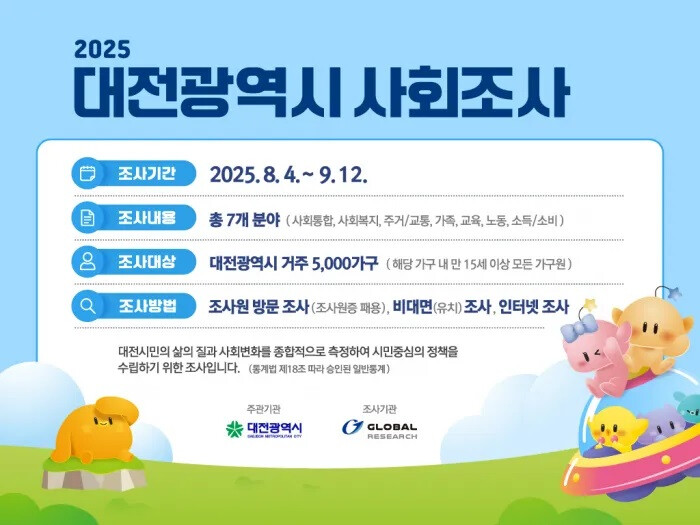
Daejeon City is conducting its "2025 Daejeon Social Survey" until September 12 to better understand citizens' quality of life and social changes. This important survey will be conducted on 5,000 households within the city to directly hear citizens' voices and reflect them in city policies.
The survey is comprised of 70 questions across seven categories: social welfare, social integration, housing and transportation, family, education, labor, and income and consumption. This year, the survey includes many questions aimed at gauging the public's perception of policies to increase their effectiveness. For example, it will focus on public opinion regarding satisfaction with public transportation, preferred youth policies, and safety while walking at night. The survey also includes questions on recent social issues, such as support policies for childbirth and attitudes towards non-marriage and non-childbearing, in an effort to provide an in-depth analysis of a changing society.
The survey will be conducted on householders and family members aged 15 or older in the 5,000 selected households. While in-person interviews by a surveyor are the primary method, households can also choose to participate in an online, non-contact survey. Surveyors will provide detailed instructions for online participation.
A Daejeon City official emphasized that the social survey is "an essential process for listening to citizens' opinions and establishing policies." They added that "the active participation of citizens will be a great help in creating policies that are truly needed."
The results of the survey are scheduled to be released by the end of this year on the Daejeon City website and the National Statistical Portal. The data from the analysis will be used to understand citizens' living standards, values, and social perceptions, and will serve as important foundational data for developing future key policies for Daejeon.
Daejeon Launches Social Survey of 5,000 Households to Hear Citizens' Voices
Daejeon City has begun its 2025 Daejeon Social Survey to understand the quality of life and changing awareness of its citizens. The survey will be conducted over about one month, until September 12, on a sample of 5,000 households, with a focus on collecting in-depth data on citizens' real-life experiences and social perceptions.
The core of this social survey is a comprehensive analysis of seven areas closely related to citizens' lives: social welfare, social integration, housing and transportation, family, education, labor, and income and consumption. The 70 questions spanning these diverse topics are expected to provide a multi-faceted view of Daejeon citizens today. The city has included numerous questions designed to measure the perceived impact of its policies. Key areas of investigation include citizen satisfaction with public transportation, the policy directions favored by young people, and perceptions of safety while walking at night. This initiative goes beyond simply evaluating policy effectiveness with numbers; it's an effort to improve policies by understanding how citizens actually feel.
Additionally, the survey includes questions on important current social topics, such as the effectiveness of childbirth support policies and citizens' thoughts on non-marriage and non-childbearing. This reflects Daejeon City's consideration of the rapidly changing social values and family structures.
The survey targets householders and family members aged 15 or older in the selected households. While in-person, face-to-face interviews are the primary method, an online, non-contact option is also available for participating households. This measure considers citizens' convenience and is expected to increase the survey's participation rate.
A Daejeon City official stressed that this social survey is "the most important process for listening to citizens' voices and reflecting them in city administration." They asked for "active participation to develop policies that are truly necessary for citizens."
The data collected through the survey is slated to be made public on the Daejeon City website and the National Statistical Portal by the end of the year. This information will be used for a comprehensive analysis of citizens' living standards, values, and social perceptions, and will serve as critical foundational data for Daejeon to establish citizen-centric policies in the future.
[Copyright (c) Global Economic Times. All Rights Reserved.]






























